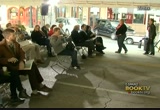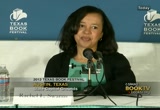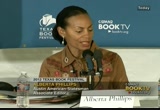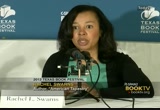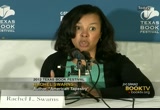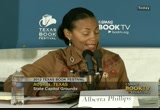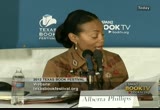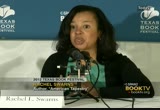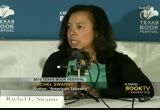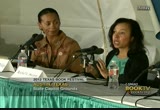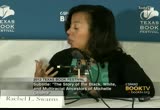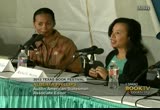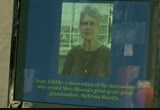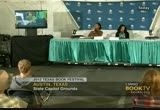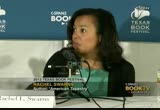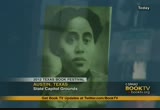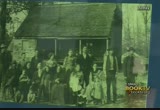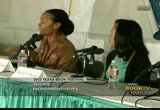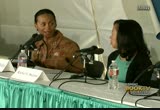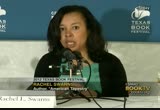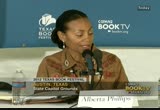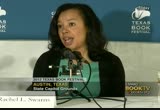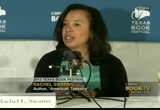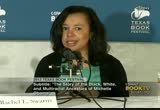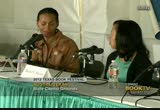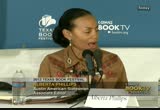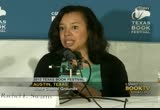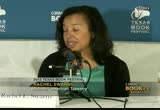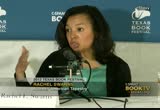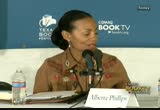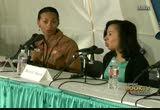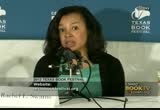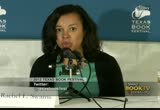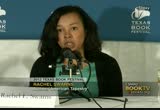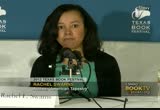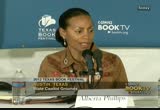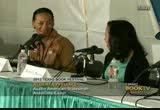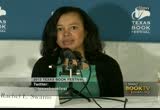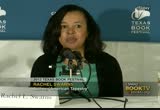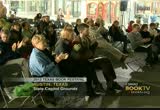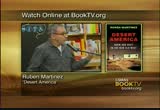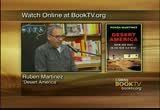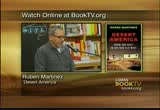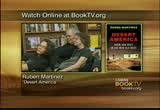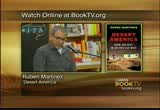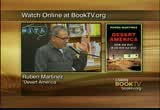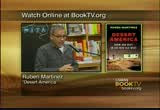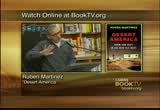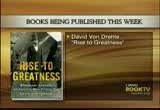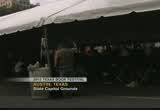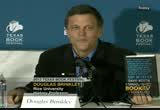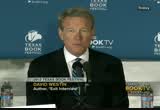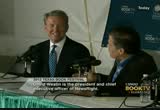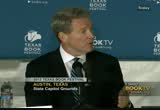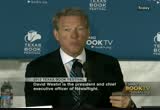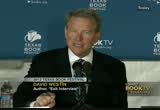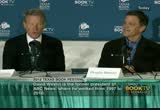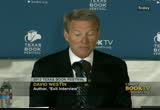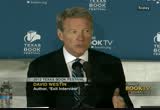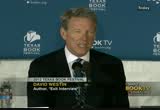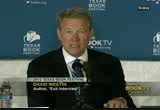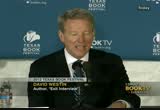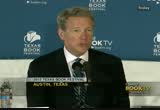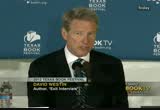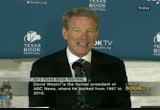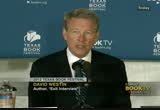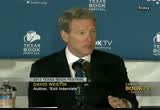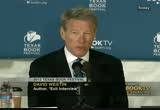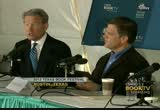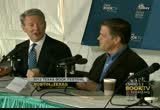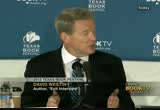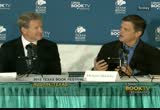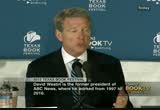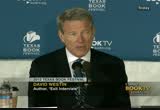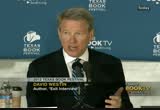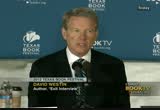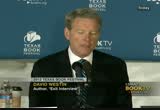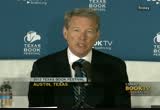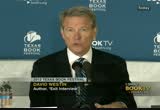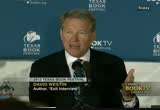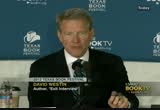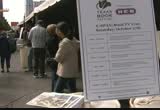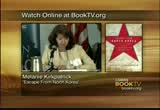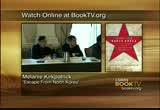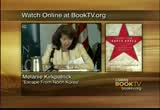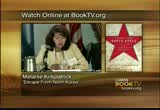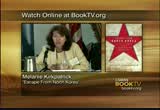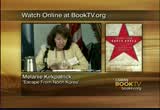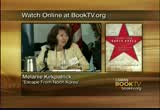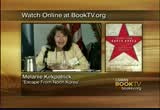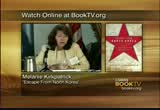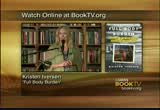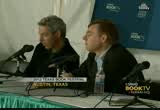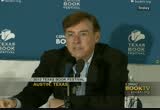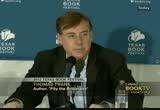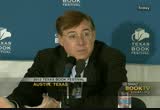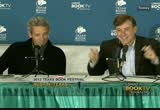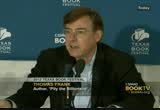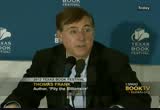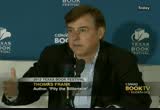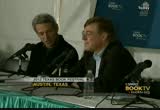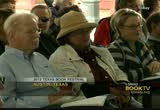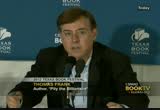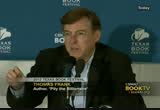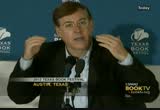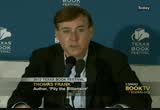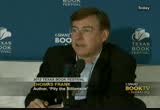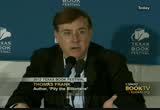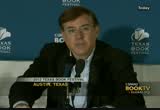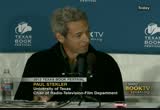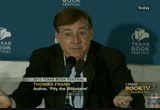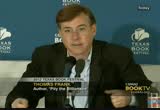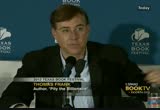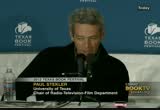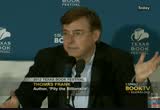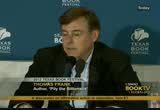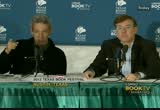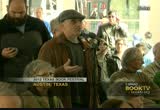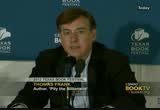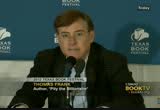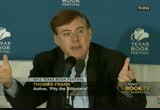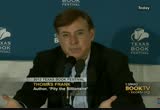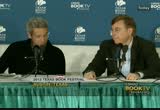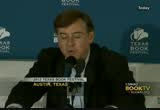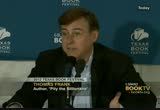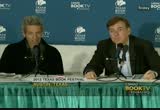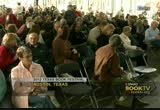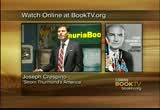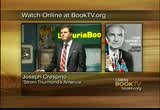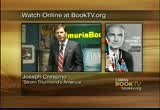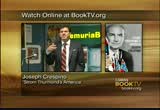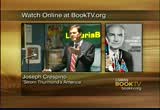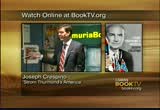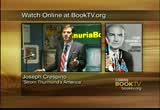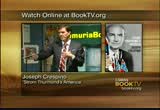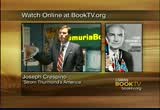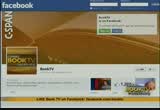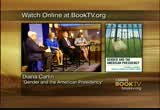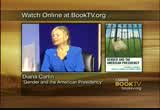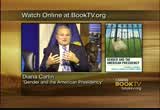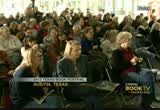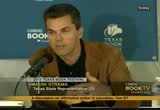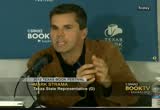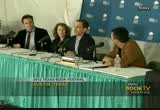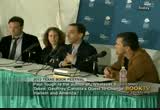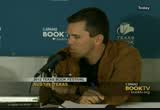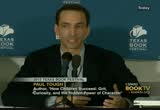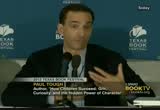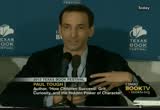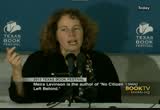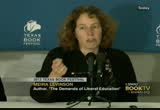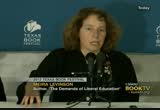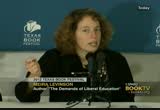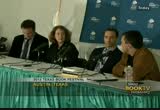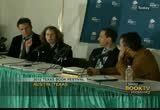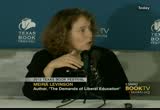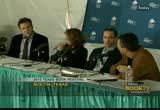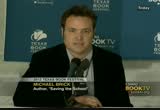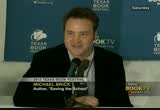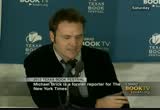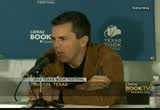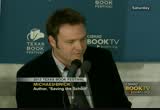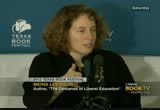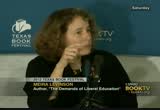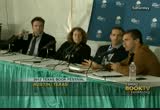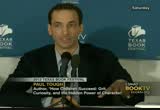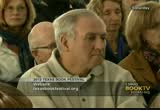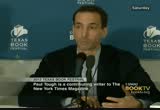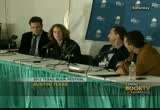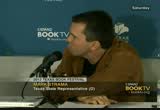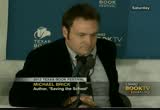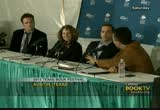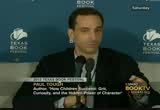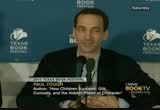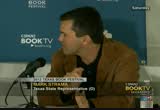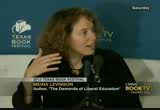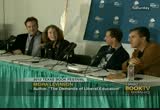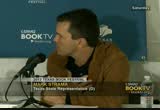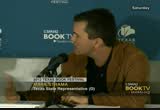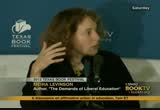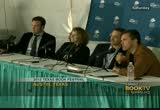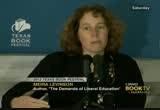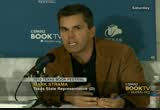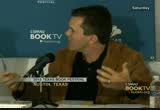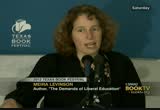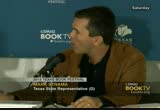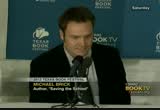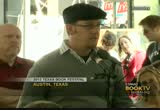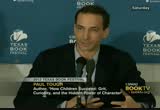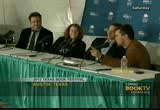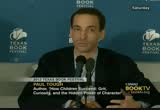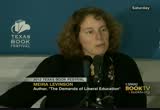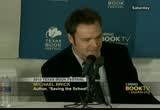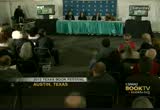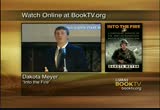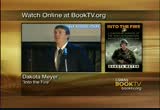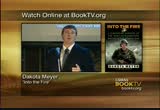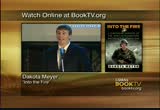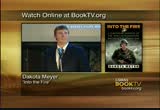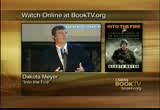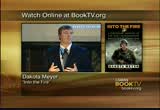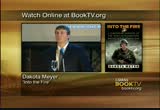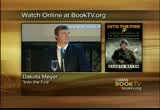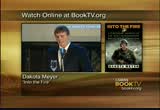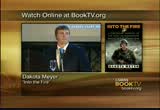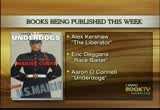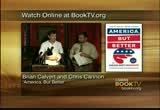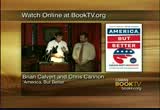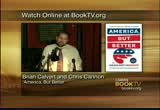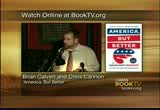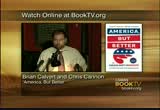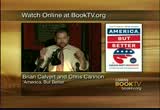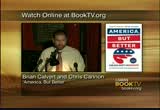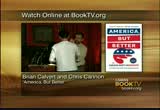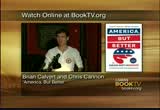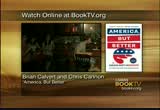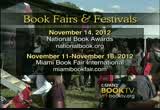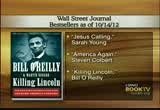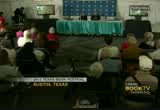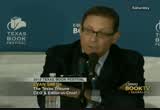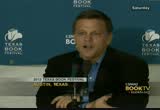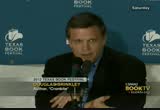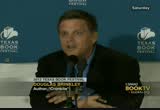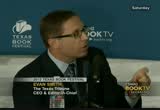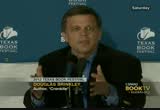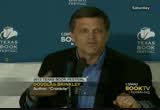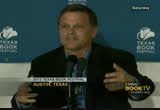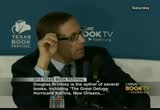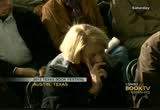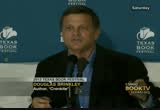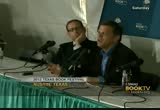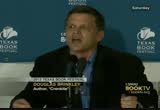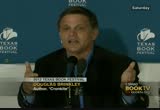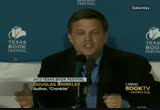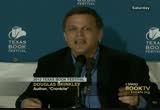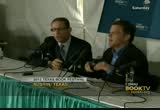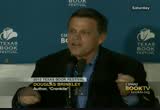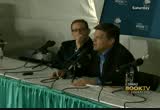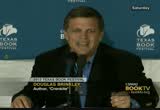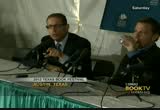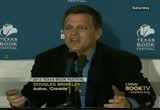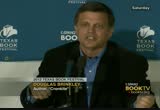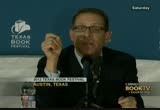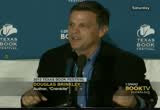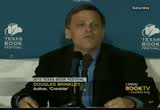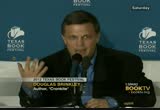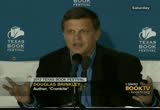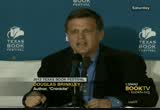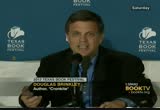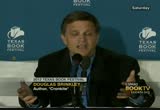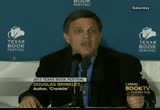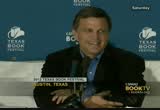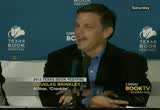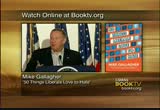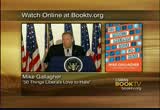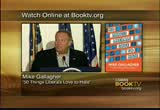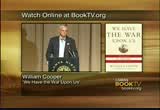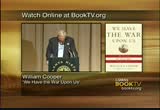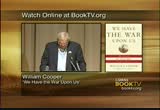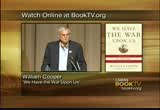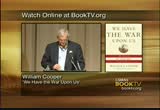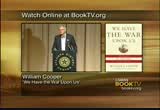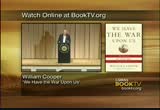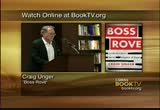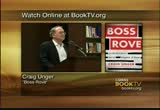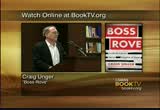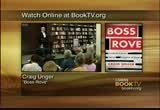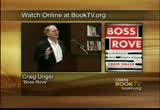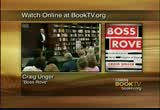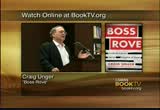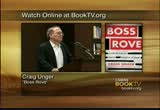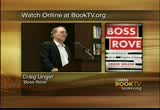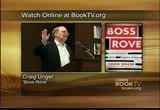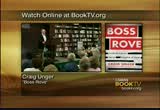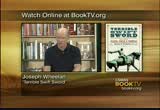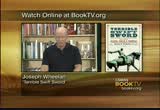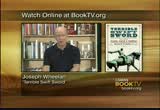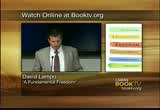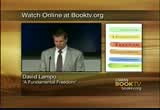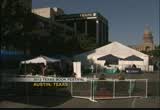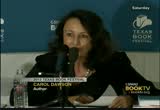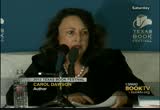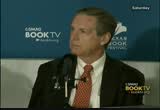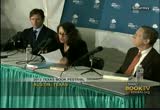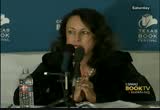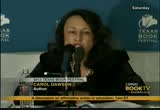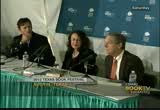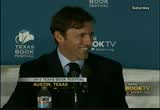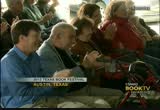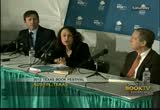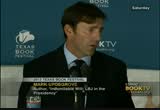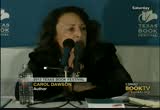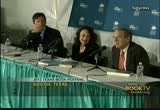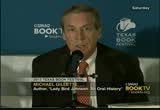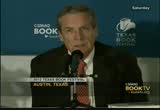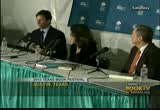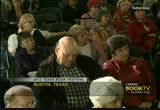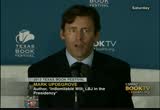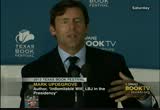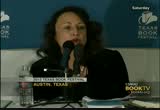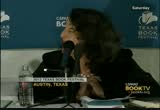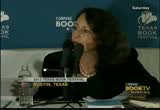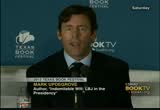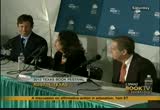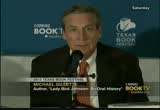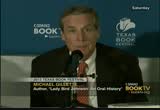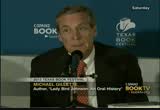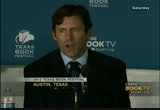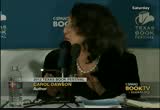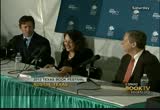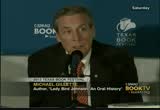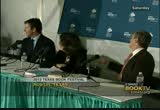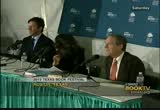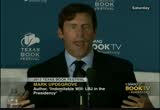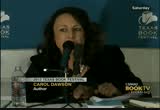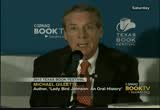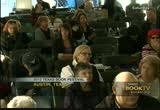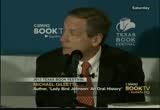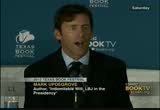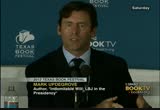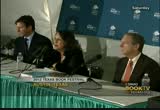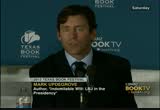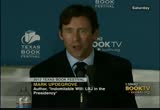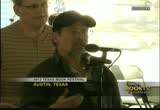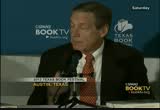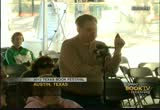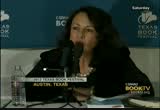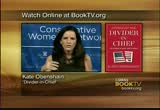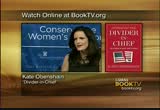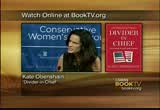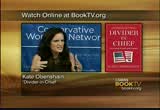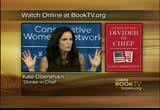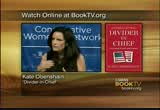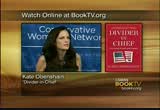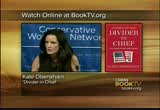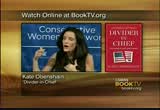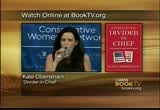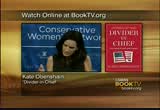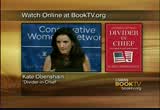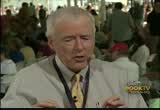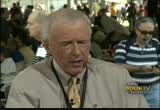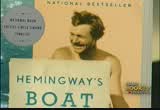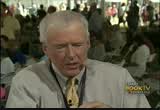tv Book TV CSPAN October 28, 2012 12:00am-7:00am EDT
12:01 am
>> good morning. or as say and say in texas, hi you all. it's a great day to be in austin texas and today i have the honor and pleasure to be at the book festival with the moderator "new york times" author and writer, rachel swarns. i'm going to tell you a few things about rachel because i know you came here to hear her and not me and because our time is limited. she has worked for "the new york times" since 1995 reporting on domestic policy, national politics, immigration, the presidential campaigns of 2004
12:02 am
and 2008 and on first lady michelle obama and her role in the obama white house. i met rachel at different events this year where i got a book that she wrote, "american tapestry" the story of the black, white and multiracial ancestors of michelle obama. after hearing her talk, i bought six more copies. i bought them for all of my family members and to give out as christmas gifts. now after having read her book i can tell you is a good investment. it helped me better understand my own family's roots and many mysteries surrounding my own family. rachel swarns's lucas a compelling story that at times has deep emotion but it's also a story about liberating -- and with that, let's welcome rachel swarns.
12:03 am
[applause] >> thank you. thank you. >> rachel, thank you for coming. in the years leading up to the presidential election the focus seemed to be on barack obama's roots and his family and the fact that he wrote his own biography. but, now in your book, "american tapestry," you put the focus on michelle obama. tell us about how you got started doing that and what inspired you. >> i was writing about the first lady and the first family for "the new york times," which was something of an unusual assignment. typically the first family is covered by the white house reporters who chase the president around on air force one and in the briefing room and write about the first lady in the first family when they have time. but there was a sense in 2008 at "the new york times" and other newspapers too that we might
12:04 am
want to do things a little bit differently. and this family, this first african-american family living in this house, this white house billed in part by slave labor, with slave labor, would be written about for generations to come and we wanted to be a part of documenting and chronicling that story. and in january, in fact before the inauguration, one of my colleagues was writing an article about the president and his rainbow family and we realized at the last minute that we didn't know much about michelle obama's and assess straight -- ancestry so my colleague reach out to -- we didn't give her enough time so she didn't find very much and we ran the lovely story about the president and his rainbow family and the they thought that was that. the genealogists kept digging and in september of 2009, the
12:05 am
first year that the obamas were in the why she called us back and said you know i found something really interesting and would you be interested in covering it? i found myself on a plane to birmingham, alabama where i visited churches, archives and tried to find out anything, as much as i could about a man at the name of adolphus shield who is the first lady's great great grandfather who happens to be bi-racial. and the story him ran a month later in the front page of "the new york times" about dolphins' parents, knelt any of the first lady's great great great grandmother who was a slave girl valued at $475 in 1852 and the first lady's great, great, great grandfather who was a white man whose identity was a mystery. and the day after the article
12:06 am
ran, and editor at harpercollins sent me an e-mail and said wow that was fascinating. a little snippet of the first lady's family tree and what do you think about doing a book on the whole thing and that is how i got started. >> we are glad you got started on the book because it really opened up a lot of information about families across america and the interconnectedness of many families. what i like about your book rachel is that it reads like a good suspense mystery or thriller and i suppose that you had to be part researcher in unraveling the story. even michelle obama herself was unaware of some of the people in her family tree, both black and white, and there were many families in america who are experiencing that same thing or who are unaware of their family
12:07 am
tree and what that has hidden inside of it. i found the following passage from your book which is also great prose and i wanted to read it. sheedy, belting out, never knew who he was or what happened between them, whether she was a victim of his brutality or a mistress he treated affectionately or whether she was love. she went her way and he went his and just like that their family split right down the middle. their children, grandchildren and great-grandchildren, some black, some white and some in between scattered across the country as the decades passed, separated by the color line and the family's fierce determination. obviously your research surprise
12:08 am
and probably stunned both sides of the family. tell us about that and how the michelle obama's family and the white side of the family reacted to the news. >> the first lady has long suspected that she had white ancestors in her family tree. like many african-americans do. but she had no idea who they were or where they lived or where and when they fit in their family story, and so i am able through dna testing to solve that mystery and her family and what i did was trace the descendents of melvina, the shields family which lived in south carolina and georgia, irish-american family, and you know the first lady's family and
12:09 am
i tested them and in fact it's the most ordinary of american stories. the white shields in the black shields are related and this is on the first lady's mother sighed, the mother marion shields. and many americans are making these kinds of discoveries you now with dna testing, just a cheap swipe in finding the connections or ancestry.com and doing your own genealogy. so it's a kind of discovery that many many americans are making but it is not an easy one for people. on both sides of the family, this was a hard realization even though people know that these things happened. many members of the first lady's white extended family had no idea that their ancestors had owned slaves, and while many people might like a connection
12:10 am
to the white house, this was a most unsettling connection to the white house as you can imagine. it's not something that most people expect to have a reporter knock on your door and say by the way, one of your ancestors they have on the first lady's ancestor and so some people typically didn't want to talk about it. some people were willing to grapple with the history and it would not be what i have chosen for myself but it is my history even if it is hard history. sharing memories and records and dna as they explored what happened more than 100 years ago. it was also difficult for the black side of the family because
12:11 am
michelle obama's uncle talked about the silence among the african-americans about them trying over and over again to get his elders to talk about what they knew about slavery and what they knew about all the different colors in the family and where the white ancestry came from. over and over again, people refuse refused to talk about it. it is one of these things that is hard for people to talk about even though it resonates still. it does resonate and it's part of our history. so getting people to talk and wrestle with this is not an easy thing. >> yeah, i can imagine and as you say some people were okay with it and cooperated and some weren't okay with it. they didn't cooperate and i've found that to be interesting in reading the book how both sides
12:12 am
incorporated that into their histories and both sides, the response to that were similar. i also enjoyed reading that "new york times" article that you wrote, because some of the photographs were in that article and you could actually see how people even on both sides of the family, black and white, they resembled one another. >> that was one thing before the dna test results came out. some of the first lady's distant cousins while they didn't know they were distant cousins then, they had photos than they were carrying hearing at the photos of dolphus shields and holding them side-by-side and saying the nose might be -- you know they were kind of cell i didn't reveal to them the dna results until the very end and by then they were not surprised.
12:13 am
>> do we have some photographs to show today? >> we do have some photographs. this is the first lady as a baby with her nuclear family. that is her mother and her family -- father and her brother. this is joan triple. she was one of the first lady's distant cousins who was willing to go on this journey and she shared with me what she knew about the family and her dna as well. and this is the great-granddaughter of dolphus shields. [inaudible] >> the this is a question that just came from the audience, which was when we were talking about melvina the first lady's great grandmother and her bi-racial son dolphus shields the time period we are talking
12:14 am
about and this is dolphus' daughter pearl. melvina was born sometime around 1844. she looked a remarkably long life and i was able to interview two people who knew her which is astonishing that she lived until 1938 and so i found two people who knew her in the last years of her life. her son was born sometime around 1859 to 1861 and he also lived a remarkably long life. he died in 1950 and i was able to find three who knew him as well. and this is his daughter, pearl, who moved from birmingham to cleveland ohio. and this is dolphus shields the first lady's's great-great-grandfather. you can see him there with his son willie. he was bi-racial as i mentioned that he was quite a remarkable man in his own right. he was born into slavery in
12:15 am
georgia and moved to birmingham alabama as a young man where he became quite a notable person. he became a property owner in 1900. he was a carpenter and had his own business. he was a founding member of two churches in birmingham that still stand today aren't still open and running today. when he died, the news of his passing was on the front page of the black newspaper there. another photo of dolphus shields. dolphus and his extended family. the tombstone of the man who owned melvinia, henry wallace shields. the tombstone at the sun charles marion shields who the dna testing reveals is most like we dolphus's father and this moves to michelle obama's father side of the family.
12:16 am
this is michelle obama's aunt, francesca. and this is stevie mouton johnson, the first lady's great and mother who traveled to about four cities in her 20s. she was a sharecroppers daughter born in 1879 and somewhere along the way she decided she did not want anything to do with the farming life. she was one of the first, michelle obama's ancestors to go to chicago in 1908. this is her husband, phoebe's husbands who was a prominent porter and minister, who also lived in chicago. this is the first lady's great great grandmother. this is phoebe's mother, mary mosby and she arrived in illinois sometime in the 18 60's. the first lady often describes herself as a south side girl but the family had no idea that
12:17 am
their roots in illinois extended that far back. if you look at mary mouton, you understand why the family says she was part cherokee. she obviously has a mixed lineage but i never was able to establish for sure whether that was true. and this is the first lady's grandfather, who left south carolina and her. in chicago in around 1931. this is the owner of melvinia's brother, and this is an amazing photo actually and there is a nice story behind this one. after the book was published and after an article about the book came out, i got an e-mail from a woman who said i think that might be my family that shields
12:18 am
family. my husbands family and i think we have a photograph of them. in fact, they did and it was the first photograph that i was able to find of melvinia's family and of the shields family so melvinia's owner is the older man with a beard and dolphus' father is a well-dressed man with the spectacle standing up kind of looking off into the distance. and it's a remarkable fine. i felt really privileged to see it. i'm going to skip to the last one. this is another remarkable moments which was after the book came out, clayton county georgia, which is where melvinia was enslaved erected and a monument to commemorate her life and they invited some of melvinia's descendents and of the last moment i thought maybe some of the white shields assistance would come and they did.
12:19 am
and so we have the descendents of the slaves in the slave owner exchanging numbers, sharing a meal together. i don't know that they will be facebook friends for years to come but it was quite something to see. >> that is a great slideshow, and all of the people you mentioned basically are covered in the book. they all come alive and they all are characters in the book in one thing i found helpful was that we have a chart of michelle obama's family tree. you cannot isolate back and say okay, this is how that person relates to michelle obama. another thing i found interesting about your book is that when we talk about slavery in this country, we always talk about it as something only of
12:20 am
the wealthy class. in other words if you are wealthy you could afford -- and if you are working class white america and you didn't really have slaves. you reference, staffers and sally hemmings has kind of an example of a wealthy family. but in your book, you kind of us that meggs -- myth because melvinia was the slave of the working class american and can you talk to us a little bit about that? see many of us when we think about slavery, we think about jefferson and we think think about gone with the wind, the grand manner, the vast plantation and in michelle obama's families there were ancestors who had that kind of history in the plantations of south carolina.
12:21 am
her family really does expose the enormous variation of life during slavery which is not something we often think about. the shields family that owned melvinia were not wealthy people at all and in some ways that was most astonishing to some of the defendants. we always heard that the shields never had two nickels rub together and they were not a wealthy family. in fact as i is they mentioned they were irish-americans who came sometime in the 1700's, work the land with their own hands and only ended up owning slaves because henry welsh shields married the daughter of a wealthy man. so when that man, when his father-in-law died he inherited to slaves one of which was the first lady's great, great, great grandmother and she ended up in a rough rural community in georgia where the vast majority
12:22 am
of people were not slave owners, where white men work the field alongside the slaves that they owned if they owned any so it was quite a different experience than the one we often think about. >> and it was quite a different experience. i really enjoyed reading about the people of that day, how she worked the fields and how the man who owned her work the fields and i know that you weren't able to determine the relationship between melting the m. and the man who owned her and i also know that there was a lot of silence, a code of silence around that relationship. it seemed like she never talked about it and her descendents never talked about it and i notice the same thing in my own
12:23 am
family and other families as well. isabel wilkerson who wrote about the great migration said that the code of silence was in her family. what is up with that sort of silence? >> i think it was a painful chapter of american history for many many families and so i think at the time people knew. it would have been very clear to people and the people who i met and knew melvinia and knew her son, knew that she was a dark-skinned african-american woman who was born into slavery who had these very -- sons and no father, no husband around. they suspected, but no one talked about it. people who knew dolphus shields also suspect did.
12:24 am
his great-grandmother said you know people whispered in the family that he had a white father but again it was something that people just didn't talk about. i think there was a sense among african-americans really is of trying to move forward and trying to move jan and not burdening future generations with a painful history, pointing to have children and grandchildren who had hoped and would find their way with that hope in this country. and you know it is a remarkable journey after all. five generations from slavery to the white house or you can sort of understand why people wanted to keep quiet in some ways, but it is a -- in a lot of ways. >> i think that's right and in talking with my own family, think that's right.
12:25 am
there was kind of a shame there too because children were born out of wedlock and as you say, african-american families were trying to move forward. part of trying to move forward was being legitimate and getting an education and making sure that your relationship, people were legitimately married. so anything that pointed backward or kind of made you illegitimate was not really something that they wanted to talk about and have out there. so i think that's right and it's really too bad because it has closed a lot of doors in our family. and that is what you founded michelle obama's families. you are able to help truly open those doors for her family. >> you know, i think, at least
12:26 am
within her family, there are those conversations happening but i think as i said, ordinary americans around the country are making these kinds of discoveries with dna testing so these conversations are happening around the country. when you talk about marriage and the importance of legitimacy, one of the other nice stories which again talks about the variation of the american experience during slavery was the first lady had ancestors who were free for decades before the civil war. one of the most interesting records that i came upon was a record which showed those members of her family who after the civil war went to the courthouse and lined up to get
12:27 am
their marriages and their relationships legitimized and recognized under the law and a lot of people did that. >> i think that if -- and i am curious how does the first lady michelle obama respond to the news when you talk to her or when this was brought to her? see one of the challenges for those of us who are writing about the first lady as she is not doing any interviews that also unfortunately i didn't get to talk to her about this. but you know, when the article came out in "the new york times," her husband's press secretary was asked about it and she said she found it fascinating. i know that her family finds it fascinating. and i think it was something that you now a lot of them
12:28 am
simply didn't know about it. i reached her along the way as i was doing my research and gave her and the members of her family and the staff ahead of time and i hope she finds it fascinating. >> one thing i read in "the new york times" when your article was published that she did have a positive reaction to it and that she at some point even traveled to africa with the children to see the places where the slaves were housed or africans when they were imprisoned or house before they were taken in the middle passage and across the sea to the americas. so i think that was very interesting, that she was
12:29 am
curious to follow her with roots all the way back to africa as well. but i do know that the book has been received very positively by a lot of people and harvard professor henry louis gates said the book really gives us an idea, a real true idea of our interconnectedness of all americans, the interconnectedness of all americans and i think we would have to agree with that. just talk to us a little bit about that interconnectedness that you found as you were writing this story. >> the book is called "american tapestry" because really her family reflected the enormous tapestry that we live as americans and all of our families and so she is our first
12:30 am
african-american first lady who has white ancestry, african ancestry and native american ancestry and we also think of this modern contemporary time that we live in as an impressive period of immigration, inter-racial marriage and checking as many boxes as you like, census but when you go back into history, if you look at the census and the late 1800's, there were whole groups of people that were classified as mixed race and all kinds of labels. this is not new and you know we think of the president and his heritage. he is the son of a white woman from kansas and an african man from kenya so we all have these kinds of connections in our families.
12:31 am
>> and if people are interested in researching their own families and their own family tree, what advice can you give them? we may not have the same access to expert researchers but what advice can you give them? >> i would like to say that i've become a preacher of the gospel of genealogy because i think it matters a lot. we often write books about our president sent our first ladies but what i loved about the first lady story is that her story is about ordinary people, and we all have the stories in our families and i think we should all try and dig them up. so i say the first thing is to try to talk to the older people in our families because we often wait too long. don't wait, don't wait. collect those photos and talk to people. collect those records that are
12:32 am
you now in boxes, an old folder somewhere. there are great tools now where you can find records and documents right from your desktop. ancestry.com is a subscriber service which has a fee. family search is one that is free and you also can go, if you know where your family -- make it and go to your local courthouse and search for property records, vital records, it death certificates and marriage certificates. for african-americans, i know many people have thought it's very hard and difficult to do and it is because african-americans did not do not appear in the census until 1870 and people would say oh what about letters and journals? slaves were barred by law from being able to read and write and
12:33 am
newspapers at the time did not chronicle marriages and births and things like that but even so it is difficult. from 1870 on, the census is a great tool and you can find people. >> that is good advice. there was a question earlier about the timeframe that the book covers and it covers a lot of territory and a lot of events so maybe you can talk about the timeframe as well as the many different events that happen in the book. >> really i looked at her grandparents and try to take them back as far as i could. so it's mostly the 1800's, a little bit into the 1700's, world war ii about 1950 and really the first lady's family had front row seats to some of the biggest moments in our history. there is talk among the shields
12:34 am
family that one of the white shields ancestors fought and the revolutionary war for and since. they were there during the civil war and during reconstruction, the migration, segregation, world war ii, really big moments in our history. >> there were several characters that really stood out to me. phoebe was one of them. if i have that right, she was warned in a very small town and would have been a sharecropper but she set her sights on the big-city and as you say there were pullman porters and the lives that they led and some of that has been glamorized but reading your book, gosh, they worked day and night, sometimes with just three hours rest so i
12:35 am
got a real view of that and the other thing that i liked, as you pulled in the different characters and put them in different places, you also talked about the black newspaper of the day. tell us how important they were. >> well, the first lady's family ended up in chicago quite early. the great migration we often think about after world war i, but you know phoebe, her great grandmother was there by 1908 and people came in the early 30s too. they did with ensher cocco and they were lucky to have the "chicago defender" which advocated and called on people to move north. the newspaper from that time gives you a portrait of what life was like and it's
12:36 am
invaluable. >> i think we are going to move to our q&a at this point in time so let's give rachel a big hand first. [applause] >> thank you. >> and you are welcome to move to the mite. >> hello. i don't know if this is on. there we are. i am from a family of major slaveholders and i have been doing a lot of research into the families of the people that my family held in bondage and i've become involved in a group called coming to the table. are you aware of this group? >> i'm not. >> it's an on line group that seeks to connect the families of
12:37 am
enslaved people and the families of enslavers and i found it to be a very powerful experience. i'm wondering if you think this kind of research into our own families can help promote racial healing? >> i think -- i hope that it promotes conversation. a lot of what i found on both sides of the first lady's family, black and white, was a lot of silence and i think that we should talk more about it. i am not naïve to think that you know, one book even about a historic first lady is going do you know, solve everything. but i think if it sparks a conversation that would be a good thing. and talking to some of the first lady's cousins, even our conversations for i think
12:38 am
meaningful and fascinating. some of them looked at me. i'm a journalist for "the new york times" for what they saw was an african-american woman and they worried. would i be fair to their people? one woman said to me, because michelle obama has said that she is the descendent of slaves and slave owners and she raises that as her story. but she is on the right side of history and we were on the wrong side of history so, but i think even when these descendents and i were having these cumbre stations than they were looking at me as someone on the other side, just being able to talk about it was a good thing. so that web site you are talking about sounds fascinating and that's a great thing. >> thank you. >> thank you.
12:39 am
>> i was wondering, the dna testing that you you were able to take back to irish-americans are you able to see in africa the people in the region possibly she dissented from what area in africa? >> it is not as precise as one would like so in fact the family, the white descendents actually know that history. they know that they are irish-americans in the shields were both shields at one point. and the dna certainly suggests west africa but that is a very common thing. beyond that i couldn't be precise and unfortunately. >> thank you. >> anyone else? this is your big chance.
12:40 am
[inaudible] >> the question was, how did i do this dna testing? and i didn't knock on the door of the white house and asked the first lady for her dna. i knew that dolphus shields was her great great father and because of the article that i have done and the research, it was suggested that the owner, the owner's son was likely the father. she was living next to him in 1870. melvinia continued to have bi-racial children after the war and so i tracked down dolphus' descendents and the descendents of the shields family and there was a match.
12:41 am
>> i am very curious the reference to the civil war is one of the important events. where their ancestors that fought on both sides of that battle and what kind of legacy was there in the family? >> the irish-american shields did fight for the confederacy. there were a number of melvinia's sons who fight with the confederate army. the union side, phoebe's stop father was not a blood relative but he was the man who was a formative influence on her life. he joined the union army and was involved in some notable battles there. on the first lady's father side, there is an ancestor. unfortunately sometimes making
12:42 am
these connections is difficult. something like -- joined the union army right around the time slavery was ending. so, but again making that link was unclear and not an easy thing. but certainly the records are there in terms of the civil war service of the late ancestors and the descendents did know about that. >> you talked about about the dna testing. what a book like this and your research have been possible before dna testing? >> it's a good question. it certainly helps. you would have had circumstantial evidence that would have suggested that the first lady's white ancestors came from the shields family that owned melvinia that there would have been no way to know for sure.
12:43 am
and so the technology you know, the 21st century technology is really what helps unravel this. 10 years ago i would not have have been able to write this book, not the way that it is now. >> anymore questions? we have a little bit of time left for the i just want to say too something about the book that made me think. here in texas for example looking at this history and particularly the history of slavery and how texas developed, i didn't know, but someone shared with me that there was an incentive to have slaves here in texas. among just regular people because as the land was given away, the mexican government giving the land away was based on how many people were in your group.
12:44 am
so if you could ring slaves than you would get more land. and so regular people bought slaves and especially in texas. there were a lot of working-class people that came with slaves in order to enhance their land grants, so i found that to be an interesting fact about texas itself. >> kind of goes a long way. just regular people in slavery. we have a little bit more time if anyone else would like to ask the question. boquet, would you please move to the mic? >> well i looked at the first lady's great granddad and "the
12:45 am
new york times" and is half rather, it's almost like the same person. if you -- i don't off the similarities were that profound but that just seemed to me anyone who saw the picture and i think that is why you all selected those photographs for "the new york times" but i would love to hear about that in terms of the truce similarities and also i would love to hear any comments you would care to share when the families got together for the monument unveiling when you have the two sides of the families together and describe the interaction between them. >> the families to find a resemblance. the family's white and black to find a resemblance. i actually was in nashville recently where another member of the shields family, another descendent from the white shields family passed along a
12:46 am
photo of one of her ancestors, a brother of melvinia's owner and was remarking on the resemblance. dolphus shields who lived in birmingham the first lady's great great grandfather lived there the first time his wife had -- and they lived not far and that kind of close to where dolphus had his carpentry shop. people knew knew him said he had a visitor, the white visitor who would comment, a man who would come and talk which was unusual in birmingham at that time which was a very segregated city towards the end of dolphus shields life. it's interesting the question of whether or not the connections even if they didn't talk about them, whether they did extend beyond the melvinia and dolphus' father. as for this reunion, it was really fascinating.
12:47 am
it was melvinia's descendents and the descendents of melvinia's owners. some of them came from georgia and some of them drove from alabama. we had a ceremony that latent county put on with this monument in honor of melvinia and her life. so they kind of exchanged stories about what they had known and they looked at each other's photographs. they had a meal together. there is an effort underway in the town where melvinia lived in kingston georgia to do some commemorative work there. she was buried in a church cemetery without a tombstone so there is an effort to try and get one there. i hear from the white shields family often about when that will happen because they would like to come.
12:48 am
so like i said i don't know how long the connection and interest will last but they are still interested, you know? >> anymore? anymore questions? we have just a little bit of time. no time? no time, okay. with that we will say thank you rachel and we will meet you at the book signing. [applause] [inaudible conversations] >> that was rachel swarns on the ancestry of michelle obama. in a few minutes when we'll be back with more live coverage of the texas book festival. are next author is former nbc president, david westin.
12:49 am
>> the this book in particular deals i think at its heart with several deserts but ultimately the subtitle is the boom and the bust of the old west so i'm looking at the way the economy affects our lives, the way the economy gets into our very bodies. it said that i wrote because my body arrived in the desert under circumstances in the winter of 1997, when i was broken and on
12:50 am
drugs. i was in mexico city where i had been lucky enough to go under a book contract from new york. i got an advance from my new york publisher to write a book. it was a dream come true and in mexico city in 1997 i had crossed the deadline and i didn't have a word written. and i was broke. i called the only friend that i could count on at that point because my lifestyle has destroyed a lot of my personal relationships. we had met through the solidarity network back in the 1980s and i said,. [speaking spanish] and she happened to be living in the area of joshua tree
12:51 am
california at that time. she was from the tropics of central america. everybody has a story in the desert of how they got there. she said we will take care of you. shortly thereafter i arrived in the desert and one of the first things that i saw when i rented my little shack out in the stands next to a sign that said dax dacs service is 100 miles, the town of twentynine palms east of joshua tree i found myself to fieldtrip and to go further out. the joshua tree which is at the edge of a beautiful park. if you are for then there you know you too album release the joshua tree. you know what the joshua tree looks like. arms going this way in that.
12:52 am
wanted to go further out. there was something was something existential i was driving me further out into the big empty to say about the desert. also because the further out you went the rent got cheaper and cheaper and cheaper. i was paying $275 a month for a two-bedroom house two bedroom house with five acres of land. the edge of twentynine palms where the sign said x. servers 100 miles and that is where the book begins with a personal crisis and arriving in on this particular landscape ultimately the desert of the site of first-order pilgrimage. and at that particular moment, i don't think i was aware of what i was doing. i didn't say to myself, i'm in big trouble with my life and i must go heal in the desert.
12:53 am
ultimately that is worth i was entering an and later on i realized all the symbolism that was there to receive me. i began the process of healing and getting to know this place which included almost immediately dealing with the fact that i was arriving on a landscape that had as many problems as mexico city with drugs. i was coming from a place of fiction and all the pain and the struggle that goes with that and arriving in a place where math labs were exploding and where young marines were training and doing lots of drugs to escape the terrible reality in their heads if not in their bodies. so if i was going to carry
12:54 am
ancient symbolism of doing the restorative pilgrimage i was also entering a place that was a -- place. many years after i moved to joshua tree and twentynine palms, a few years later i met my partner who happens to be sitting in the audience tonight and who is also written a wonderful book about the desert called the pastoral clinic. i met angela far way from the desert but she is from the desert and that is one of the things that you know i think i fell for immediately about her. the fact that she was a desert girl, a western girl, w from south valley. and we ended up living in new mexico together while she was doing research for her dissertation on addiction. she is a medical anthropologist.
12:55 am
a shout-out to stanford. and so i followed angela onto another landscape, northern new mexico which i had already seen. i had been their couple of times as a tourist when i was younger but we have all seen northern new mexico represented artistically. at nazi him, whether you know a postcard of a carousel at a truck stop or georgia go o'keefe artist painter, the writers of films, how many westerns have we seen that have the landscape. northern new mexico in particular has a very powerful draw in terms of the enchanted
12:56 am
landscape indeed and the official state nickname of new mexico is plant enchantments which carries a wisp of new age mysticism with it and soft and glowing and warm and fuzzy and and a much more complicated reality and ultimately that is what desert america is about. it's about how we imagine the desert or how the desert has been imagined for us by the misrepresentations that have created this imagery and created this vision of the desert for us that is consumed and bought and sold at the stage on which real estate is ultimately sold in hotels and if you stay in hotels you get tourist packages etc. and how complicated have complicated the actual human geography of place is. you imagine the place and then there's the lift place so i am going to take you to northern
12:57 am
new mexico briefly here. angela chose northern new mexico. she is from central new mexico, albuquerque. both of our families have issues with addiction. i think that was another point of encounter between us. but she chose northern new mexico i think not to be right next door to her family but close enough so that we could visit often. and also because northern new mexico there is this place called the s. pena lavallee which runs along highway 58 which ultimately comes out of santa fe and goes to taos so if you have driven for santa fe to taos it's called the low road. and that place in northern new mexico has the highest rate of
12:58 am
heroin addiction and death from overdose from heroin up anywhere in the country and it has for a long time and the problem is not getting better. it's getting worse. >> you can is now the programs on line abutt tv.org. >> here's a look at some upcoming book fairs and festivals happening around the country.
1:03 am
[applause] and before i get to endure book, did you plan? where we brought up? did you think of being in journalism as the teen-ager? >> i am from flint michigan i went to the university of michigan and became a lawyer and clerked for justice powell for the supreme court. and was plucked out of the parent company of the nbc. through the a roundabout way i was a success of that was a legend.
1:04 am
is not something i ever sought to do. i thought we would have a succession plan. i actually began to love it. but abc news is a rare privilege to give people a sense of what it was like. >> host: how do go to the supreme court? what did you learn that help to run abc? >> i went as an undergraduate. i was fortunate it was the great wall school. -- law school. i did pretty well. use serve on the law
1:05 am
repealed and hope to clark. i was chosen by justice powell. the supreme court is an amazing institution. the only part where the senior people do all the work. the justices read the briefs it does not work that way with the president or the senators. a great institution but justice powell out of virginia was a truly extraordinary man. and learning from him and his judgments and how to trust people, how to make decisions and the courage of his convictions taught me much of what i learned about leadership. >> host: i wrote a wonderful book -- a book on walter cronkite. >> guest: a wonderful
1:06 am
book. [applause] >> host: looking at cbs and nbc but abc came on strong and was 1/3 of the big three. how did abc news get on parity? what is the timeframe? >> abc news was the fourth thought of three. [laughter] it was very weak by all accounts. there were two nbc networks they had to spin off one but they started to build up the entertainment part. he concluded the only way to get to parity was to build a great news organization because the local stations
1:07 am
made most of their money. so who created wide world of sports and the modern olympics said spend as much money as you want, which he did. [laughter] he built it up starting 1977 through the '80s by bringing in big stars. david brinkley, diane sawyer , ted koppel, he brought peter from overseas. he had barbara walters already. amazing graphics and was very aggressive. he built it up to a powerhouse. >> what was his personality like? >> guest: he was 18 yes.
1:08 am
not in his demeanor. he was on the shy side and totally absent he never returned phone calls of anybody. at night you have a crisis there is an answering service. he never returned a phone call. after he died you know, why he never return phone calls? if you were calling him it was your problem. he did not care about your problem. but besides having a very large vision a unique ability as if he had never watched television before. they know people on the air
1:09 am
they spent a lot of money but with roone he acted he could look at it like anybody did at home and gave him a great sense of what worked and what didn't. >> host: how did you become a president of abc? >> guest: a great question. the people ask that at the time. believe me. [laughter] i will is the general counsel than oversaw production been president of the abc television network roone on paper was my supported and although he did not think he had any bosses and was largely right but toward the end of roone career while he was part of the wonderful news organization it was in tough shape and people would say
1:10 am
we love roone, we don't want anything bad to have been, but he needs to move on. cnn was on the table, nbc was on the rise, you have to have a replacement. i spent a year and a half looking for a replacement for the lead gent. then i pulled led dick cheney. [laughter] i told my boss bob eiger i know these people i work with them but i am not sure what to do it. he said i am sure you could but i do not know if i want you to so i went in as a good corporate citizen because i valued abc news. i thought it was a two year transition but then i really came to love it.
1:11 am
it was an inspirational experience foreign be 87 tellme of the trials and tribulations of president bill clinton. you come been during the '90s with the impeachment, i did you have to deal with second term clinton problems? >> a good part of my first year was dealing with the clinton issues. monica linds the broke 10 months into my tenure january 1998. i was down in cuba. 10 days peter jennings and ted koppel was down to cover the event from cokie roberts say we have this
1:12 am
investigation that looks like it will break a young intern who has told her close friend she had a relationship with the president. i said that is ridiculous. we have no reason to believe she tells the truth. and we just confirm janet reno is officially expanded the investigation into the whitewater investigation with obstruction of justice charges relating to this young woman. than we were off and running. you cannot ignore that. later we broke the story. some of the supporters were upset being buffeted by both sides and abc news were put
1:13 am
in front and center early on this story of the infamous blue dress. we had that exclusively personally vetted. one lesson learned an exclusive is great as long as it is not exclusive to long. but then people start to question if you have their right. cbs news, robo rivera said this is bogus. we were exclusive for about six and a half months before it was confirmed. we had a lot of pressure. >> host: i went to the clinton library and i did not see the blue dress. [laughter] it was not there. [laughter] >> guest: time goes on but in writing the book i read
1:14 am
what was happening at the time. it was always an awful story it seemed potentially very important and tawdry. at the time it was reported the basic claim of the white house and never happened. she is lying. clinton met with cabinet officers and said it did not have been. friend said she makes things up and fantasizes with romance. there never had been a blue dress i am not sure where it would have ended up. >> host: when clinton left office he did not even want to be enough of a lot to his detriment he probably could have won with clinton at his side. there was still a stigma.
1:15 am
now in the 2012 cycle he is a rock star drawing a bigger crowd and getting praise. how do think bill clinton has rehabilitated himself so fully? >> i agree that the 2000 convention and bill clinton came down the long white corridors like gary cooper and high noon that. [laughter] i was sitting with george stephanopoulos. i said it al gore should say me to. he said no. there's too much discord at this point*. but i do agree. i think this is a short coming including us the american people were ahead of us from the beginning
1:16 am
they figured out quick he did it they disapprove part of the but he was a good president. let's go on even when he left office the job approval ratings were quite high. but the clinton global initiative have been truly extraordinary make the difference around the world. >> host: mentioning george stephanopoulos you inherited him what made you have confidence he could make it in the world of broadcast news? >> george was a contributor on the round table this week. i sat down with him.
1:17 am
i would see how intelligent he is but also a wonderful student he is willing to go back to relearn i said i don't know what you want to do at the time teaching at columbia had just written his book 51 to give this up i think you could be great. he said i think that is what i want to do. i said promise you go back to the beginning. there is a kraft that you don't have. he did it. was removed him into the anchor there was a lot of controversy. the left he betrayed clinton the right thought he worked for clinton and the affiliate's were saying we don't think he is an anchor.
1:18 am
we worked hard but he was superb brian very proud of george he deserves what is coming his way. he is a decent man. >> host: i agree completely. one of the best in the business at what he does. now george w. bush tell me what he is like. did you have any squabbles with the bush administration? >> search of a. but i met him when he was governor running for a president pro when you get into a presidential election year you invite all candidates to come and meet with an informal meeting in new york including all gore. george debut bush said you can come to austin, texas.
1:19 am
[laughter] it was very enjoyable, very quick i thought the media underestimated his intelligence i was impressed for president bush. that said in two 9/11 with the wars in afghanistan the bush white house was very aggressive and particularly pro-growth to not hesitate to let us know when he was upset. he was doing his job. but he was very effective and took issue with things we did and responded the best we could. >> mentioning correspondents
1:20 am
but what is sam donaldson like? >> exactly what you see on the air. irrepressible. he cannot help it. [laughter] he does that home. he is sell energetic and passionate he loves the news, washington, of politics and is wonderful begets in his own way. i put sam donaldson back into the white house he was there was reagan for many years i was not comfortable the way we were covering clinton i think three months before the scandal broke there were reports i knew was coming. they thought that is why.
1:21 am
>> host: what about peter jennings? he seems to be touched down. we all miss him from his professionalism and died way too young but what was your relationship? >> anybody who knew him would say it was complicated. everybody's was. somebody i do this, even today and list sorely when we lost him from abc news as an editorial influence. peter was a great journalist but he but skeptic in chief. he was my teeth skeptic. he said you need to understand we doubt that you take this seriously.
1:22 am
you are punching a ticket on the way through. he was that way. barry direct. i am pleased to say we formed a close bond news people over time and have remarkable bonds because they cover news stories and dangerous situations are under pressure with a lot of risk i am delighted to say the monica lewinsky impeachment we were on the air to differ hours as the millennium daunt of the new year around the world and every time zone.
1:23 am
then we had 9/11 that builds up the new toll sense of trust and affection. but peter was a wonderful journalists looking for the contrarian position sometimes you could go to far that was true but to say whatever happens he always said i am not so sure. i wish we will listen to him more. >> to do you ever see the news was not a big story? climate change has not gotten talked-about rehab
1:24 am
this whether in this science is overwhelming you don't see it on the nightly news to say we have to cover this war? one was the environment every time we tried to do a prime-time special meehan leonardo dicaprio interview president clinton and i was killed for it. we did the prime-time special he was the chairman of earth day i thought he would make an appearance be interviewed the president. that was the attempt. but we did more tears them
1:25 am
coverage before 9/11. we did a prime-time special but the military said the biggest concern it is enacted of terrorism of. i wish we had done more. education is not covered in the depth that it should be. some of our difficult to do with television. >> host: how much pressure is there to do entertainment as news? lindsay lohan or the superficiality? to seem that journalism has gone down is there pressure what is the news?
1:26 am
>> there was the disagreement with princess diana coverage after she died and peter said it was a terrible idea but then came around. it was a constant battle within myself and is a line it has moved the cronkite book those issues have been around even walter cronkite did things that today you say you're on the entertainment side. but the real danger is if you throw up your hands to say entertainment. the broader issue is more getting the audience. this is the ongoing tension
1:27 am
i had a major anchor early it on say i don't care about ratings and you shouldn't either. i said i know police that and i don't think you do the there. a few are journalist you believe it is important you want as many people to hear it as possible. if you don't care you're keeping a diary. that is a challenging rewarding part to do something like television news. it is easy to do one or the other and do noble things and you can see where it goes off one way or the other bayou also cover
1:28 am
something important. >> ted koppel just how influential my line was what makes him such a journalist? >> but what it takes is he is very smart. in the end there is no substitute. george is very smart. these are complicated issues. ted has immense curiosity and talking to different people comment head is peerless. he is not afraid of anybody anything. him in the royce c. bourse have departed and they said
1:29 am
want to be imbedded. i said i will put my main anchor going into baghdad? we talked about it and they persuaded me. they spent three weeks with the troops. he is willing to take on anything. ted is the personification. >> host: tell us about diane sawyer but the news industry truly the old boys' club and did she have to break the glass ceiling to serve as the anchor? >> they did. some of that happened before i came. barbara walters was the path breaker. she had to put up with all lot with the quota of how
1:30 am
many questions she could ask so the man could ask more. then diane came along and took it to would different level. she has a wider range of than any tv journalist. she could have an insatiable desire to do something different and deeper. they established wind could be anchors and katie couric did what had not been a for barry substantive off the prompter and transformed morning television without a doubt. now you have a wealth of wonderful women. , martha raddatz we hired out of npr as a great reporter. and supported her.
1:31 am
she is fabulous national security reporter. i am biased but i am so proud of what she did because she clearly knew the material so well. it is not just looking good but i felt she held both accountable. going at all sides. not just abc but we have to think barbara and diane. >> host: to last questions. october 2008 the stock market tumbled the beginning of the great recession embargo and when it started
1:32 am
to tank? >> if you ask us in 2007 we thought it would be determined by foreign affairs. it is clear it is only about the economy. we were struggling and talking to people on the inside. the thing that is most disturbing was the shock in their eyes. they were scared which scared us. one of my colleagues said light covering a flood lawyer on basement was flooding. on top of that our advertising went away. said they cut discretionary. advertising is at the top. we had the enormous
1:33 am
financial pressures and had to gear up to cover the deterioration of the economy. which we have not recovered from to this day. >> host: barack obama, how big of a story that an african-american became president of the united states? >> personally, it did not seen an until i was in the control room when he won i remember standing there thinking he could be president of united states and the significance of the african-american in my lifetime struck me personally. clearly it changed so much in the way we perceive one another, race, as an absolute milestone. now that said, anyone would
1:34 am
have be 10 there republican in 2008 given the economy. it is hard to have 12 years of the same party unless you of four more years of the same. with the economy at that point* there was almost notes chance personally. with hillary clinton was nominated she would have been elected. is a momentous occasion. >> host: any insights right now? [laughter] all this time in the newsroom where is it headed? >> i don't know any more than you do. [laughter] >> i think it is 50/50
1:35 am
country and it is a mistake to predict one way or the other. almost apart from the candidates there is the even division. i have said from the beginning i think it will come down to ohio. i believe there are more autoworkers living in ohio than michigan. it will be interesting to see how that plays out. however it comes out, i think these debates have been wonderful for the country. one week before the first debate it is all over. why do repay attention? the energy and interest tavis gone up. it is a much more exciting race fed is good for
1:36 am
democracy. >> host: talking about exit interview. line about the microphone. >> understanding you are biased can use speak to your competition that is now brian williams and his bunch and the cable? >> rican is terrific. number one. has paid his dues and they have a great news operation. they are faltering a little bit in the morning but they deserve all of the success they have had. i have enormous admiration for cbs. the longtime executives of "60 minutes" has taken over
1:37 am
as chairman and they have decided to go a different direction with their newscast to do more international and hard news, as substantive. a true difference. their number three but i admire they take a different approach. cable, when i came in march 97 both fox news and msnbc were only three or four months old. fox news moved away from 24 hours which is a potent combination making them a lot of money. they have a defined audience deeply engaged they are passionate. that is fine but i am more
1:38 am
rated is starting to skew how we look at the world where more are in the center between fox news and msnbc you think everybody is off at the 10-yard line. i am not sure that is healthy and the long run. >> what of the criticisms of broadcast news as cable has moved to polemics the broadcast people have taken on the role of saying there is this view and that the without confronting the media lot of people live with their own fax. i worry about them saying a and beef without getting only with the five minute segment i could not agree more.
1:39 am
[applause] exactly. >> i think like you do it is a tribute they should to bid that he said/she said. some instances that is a program at the there questions there are issues that have answers. if you were in vietnam in 1969 you would know john kerry was a liar or a hero. too much of the coverage default in putting people up on both sides. "nightline" said that team back to be a mom that year
1:40 am
and found villagers who recounted what happened. i concluded there was right or wrong and john kerry was right to. there is a host of questions like that. there are some polls that are reliable. sometimes the news media puts them all up there. how many medical studies? i think that is something that people owe you. >> i stick to the medical study that caffeine and alcohol are good for you. [laughter] >> i am an avid abc news watcher. i feel there is the decline of quantity of hard news in favor of fluff news. they spend more time on what michael jackson had then what happens with mitt
1:41 am
romney. >> guest: i am delighted you are an avid abc news watch your. people ask me with the news is headed. it is always changing looking back at walter cronkite, it will continue to change. i continue to watch in abc news there is always material i think it is just great but things are different. something i learned is if you want more substantive news coming international or whenever, you influence that. the matter the journalist or news organization there react to the audience. they care. there is great news
1:42 am
reporting with tv and radio if you want more of that spend your time and energy. the reverse is true if you watch the extreme opinion you'll get more of that. i would get a call it is outrageous they are covering the kardashian but then they recount graphic detail. [laughter] it is clear they have invested a fair amount of time. just turn it off. we all share in the shaping of revenues is headed. >> i am a daily watcher of abc. i like the serious on made
1:43 am
in the u.s.a.. hbo can mount with the news room. has that been instructed to the regular networks? what is your opinion? >> made in america was after mine time. i think that was diane sawyer. i am delighted that you like it. i have watched it i find it very entertaining and i think it is successful but there is a danger like lawyers with loss shows that you know, too much. it is a little simplified and black-and-white or
1:44 am
preachy but having said that, we cannot be reminded to often about why we really came here. you will cover stories you're not that excited about. 9/11 was a terrible experience for everybody in the country but no doubt once the towers came down of what we redoing. you cannot remind us often enough of the noble part. it is useful to that. >> host: we're down to the last question. >> mentioning the news room there is so many people. a lot to go into that reporting field
1:45 am
producers, writers, they feed information and they never get the representation. today feel the same amount of self worth? >> a great question to end on. i can tell you there are literally hundreds of men and women names you will never know that do not make much money to come in every single day to get everything they have. and not because of the glory or the fame it -- there deeply dedicated. sometimes we got along or write to but a do what people who have not had my opportunity to understand their working on their behalf and respected for that. >> host: thank you.
1:46 am
1:48 am
>> the year was 1981 or 1982. living in hong kong for the asian "wall street journal." the op-ed editor one day a submission and crossed my desk written by the italian journalist and had secured of very rare be set to go to p'yongyang and had written an article about it and send me a translation hope in the asian "wall street journal" would publish it. we did. i was blown away. it is i opening even with the mass public worship that was the then leader like reading a chapter from 1984. george orwell's position
1:49 am
came to light and i could not get to the closing line at of my head. it read when i got off the plane i kissed the ground happy to be back in a free country. china? 1981? i had been there. it was not free. was a possible there could be a place that north korea could be worse? thirty years later we know the answer. it is the world's most progressive state. people aren't slaves of the kim family regime. they control even if they get to eat. religion, and no rule of law , percy political infractions are met with
1:50 am
harsh 10-- punishment meted out three generations of political fender knows when he goes to present his parents and his children will pare -- probably go with him. there are 200,000 north koreans today in the gulag may be as high as 2 million have already died. the reason reno this and much more is the testimony of those who have escaped for the these are the people i write about in my book this comes despite the regime broke to keep it secret. north korea has been not from the world's eyes. the regime has pursued the isolationist policy and has
1:51 am
an iron grip want access on which is strictly controlled. to give one example every radio must be registered and the dial must be fixed to the government-run radio station. security police equipped with scanners tried to identify households where residents have tinkered with the radio and tuning in to foreign broadcast. surveys of north koreans hiding in china show a high percentage listen to foreign radio broadcast in defiance of the role and their motivation was in part influenced by what they heard. people are hungry for information. north koreans must first go
1:52 am
to china. they cannot go south because the dow militarized zone along the 38 parallel is the most militarized border in the world and a possible to get across unless you are a shoulder at -- soldier shown the safe route. instead they go to china. then they have exchanged one circle of hell for another. china's policy is to track down the north koreans, send them back and arrest them with a face imprisonment or worse for the crime of leaving their country. this policy of china is immoral and violation of
1:53 am
international treaties it has signed. nevertheless north koreans decide to risk an escape nobody can accomplish this on his own some people can get out of north korea on their own but if they want to get to as out day shattered china they need help. this is where the new underground railroad comes in. like the original three civil war american south it is the network of safe houses the operators are traffickers and christians whose religious beliefs compel them to help the
1:54 am
korean brothers and sisters. thanks to the underground railroad increasing number reaching safety in the "south park" of the explosion of north koreans that has gotten out is striking and south korea keeps track of those who reach let me share a couple of the numbers in 1990 only nine could reach south korea last year 20007307 reached safety in the south. the people who get out have formed the enough they are educating us about the truth of life. there have been several
1:55 am
books published and now we have a much better picture of the truth of the existence. but refugees are performing another function. they help to open their own information and homeland. now as the world knows more about north korea they know about the world thinks to the efforts of those who have escaped to. how do they do that? and the immigrant who goes to a new country what is the first thing he wants to do? let his family back home no that he is okay but for the north korea in this next to impossible economic a phone call, email, a text message, facebook, you
1:56 am
cannot even mail a letter. the exiles have created a black market of the information to higher chinese couriers to deliver messages or chinese cellphones tell the relative to go near the border at a certain time to receive a phone call from the relative who has escaped. in south korea exiles have formed organizations whose purpose is to get into north korea. there are four radio stations run by exiles that broadcast daily to north korea. the mantra it is the most prosperous nation and they are the happiest is being
1:57 am
exposed for the lie that it is. hot spent growing up been dead nuclear shadow of rocky flats is about my childhood been the colorado growing up 7 miles from the rocky flats nuclear weapons plant. our first house was 7 miles away. 1969 we move to a subdivision that was closer to the plant about 3 miles away. my siblings and i had the
1:58 am
idyllic childhood. horse is, spending time outdoors writing in the fields and swimming in the lake. we had no idea what went on at rocky flats. we had no idea of the environmental contamination. put 10 -- carbon tetrachloride and plutonium and things in the environment. i worked at the plant myself and got a sense of what it was like to be on the inside. one evening i came home and turn on the television there was a show on and "nightline" the expos a of what was happening at the plant for the first time i had an awareness and understanding of what was happening and how
1:59 am
extraordinary the contamination was. on that day i decided to quit my job and then i decided i would write a book. it took me 10 years of research. i wanted to write a book that reads like a novel but have believe what noted but it is all factual but i want to write it from that perspective of all different kinds of people whose lives were affected. not just residence but some of the activist, thousands of people in colorado and beyond. i also felt passionate that we continue to deal with the legacy of the production of
2:00 am
the environmental legacy and cultural legacy in the way that it affected people. when i looked at the plant, we would could call ourselves cold war warriors no one told us we did not know what was happening. the rumor that the plant was operated by a dow chemical thinking they were making household cleaning supplies. my mother thought they were making scrubbing bubbles. now there has been a clean up that has been controversial with levels of contamination remaining in the soil. 1300 acres are so profoundly contaminated they can never ever be open for human
2:01 am
5:46 am
5:47 am
okay. >> testing, one, too. >> do you want to give your mike -- >> testing. >> i see don carlo. >> good. >> okay. >> hi. welcome to the texas book festival panel on ladybird and london. my name is carol dawson. i love being a moderator. every year at the texas book festival, and particularly love this task this year because i have had the privilege of reading two books that interlock so beautifully that it provided one hold 360-degree experience in reading them. before we begin, and i introduce our authors, i want to remind you all that all proceeds of
5:48 am
book sales at the texas book festival goats the libraries of this great state. so, please avail yourself of the book tent and after a recession is over the book signing tents where you can get both of the signatures of these two wonderful gentleman on the front pieces of your books. now, our panel today, as you know, is about ladybird johnson, an oral history, and it involves a total of 18 years' worth of interviews with ladybird johnson . and indomitable will come lbj in the presidency, the interesting thing about these books is that ladybird memories and history leading up to the presidency, and where it leaves off mark up
5:49 am
digress book about lbj begins, and it is a tapestry of voices commenting about lyndon b. johnson. michael gillett who assembled ladybird sorrell history directed the lbj library oral history program from 1976-1991. he later served as director of the center for legislative archives at the national archives and is currently the executive director of humanities texas in austin. he is the author of launching the war on poverty, an oral history. to my right mark of the growth is the current director of the lyndon baines johnson presidential library and museum in austin, texas. a post he assumed in october of 2009. an award winning author and presidential historian, he has written three books relating to the american presidency,
5:50 am
indomitable will lbj in the presidency was published by crown in march of 2012. baptism by fire, a presidency took office in times of crisis in 2009 and second act, presidential lives and legacies after the white house. he spent much of his career at time magazine, first as president of time canada and toronto and then as los angeles manager. he has also been a publisher of newsweek magazine and the vice-president of sales, marketing, and operations for yahoo canada, so he is obviously covering the digital ground as well as the historical and archival ground. welcome to you both. thank you both for these marvelous books. i have had such a good time reading them. and reading the overlaps and the discrepancies. the first thing i want to bring up actually is a very
5:51 am
interesting discrepancy between the two. these two people who came together in marriage ladybird johnson and lyndon johnson incredibly different personalities. i'm sure most, if not all of you are familiar with the idiosyncrasies and a famous legends about lbj, shall we say, iran stability, crudeness, larger-than-life personality, contradictory nature, and absolute will to get things done and the things he got done were very important things. he could not have done these things, it is my belief, especially after reading these books, without ladybird. ladybird johnson, born claudia taylor was an incredibly
5:52 am
gracious southern woman who grew up in a semi tomboyish practices and the surroundings very near catholic in far east texas in karnak. the fact that she grew up in a town named after a famous egyptian temple, i have always found very interesting. not far from milesian fields, by the way. but she grew up isolated. lbj grew up very much a part of a community, but in a very different part of texas. when they came together they formed a balance that i think is one of the most interesting marital histories in the history of political america. the one thing that i want to employ of really quickly is how ladybird got her neck and. how many of you have heard the story that she was named by her
5:53 am
african american nurse when she was about two years old because she was as pretty as a ladybird. please raise your hands. this is what mr. up the growth tells us in his book, but mike gillette has something else to tell us entirely, and i'm going to let him tell us. his particular story of how that came to be. >> well, she told me that the name was actually given to her by her to african american playmates, stuff and doodlebug. and, of course, ladybird is another word for lady bug. apparently it was decided later at some point that it needed the name -- the name needed to be attributed to her adult nurse because to do otherwise might give the indication of social
5:54 am
interaction between the races, but -- and i have never read that anywhere else, but that is what she told me anyway. taken for what it's worth. >> isn't that fascinating? it's like the precursor to the civil rights act. >> this conversation is taking a nasty turn since i found out i got my tac -- facts wrong. [laughter] >> you know, you got so many other facts right in your book, i don't think you need to worry. i would like you each to talk a little bit, starting with you, marc, about the different facets and aspects of the personalities to which you were privy, in particular in your case lbj and some of the dynamics and contradictions in lbj is personality as reflected by the many voices that you have included in this book. >> well, i'm looking at in the audience. many technology to people, one
5:55 am
of whom is harry middleton. terry was the first director of the lbj library, my predecessor, my dear friend, and so much of the scholarship about ladybird johnson comes from the work that harry did in the lbj library. the other one sitting next to him is surely a chance to work for mrs. johnson for many years into recently prevailed with the united states post office in getting a postage stamp in honors of ladybird johnson. [applause] a friend of mine and harry's ensure lease was a speechwriter like kerrey for lyndon johnson, and i think he put it very aptly when he said, allowing for shades of subtlety there were many lbj is as there were people who knew him, and as often as not people they saw or contradictory. and i think that says so much about lbj. he treated everybody differently because i think as hubert
5:56 am
humphrey called him, the world's best psychologist, he understood how to get people who mattered to say yes, and that meant treating people in very different place. so that is why i think that one of the reasons that people saw him so differently from person to person. >> thank you. mike, would you please talk a little bit about what you discovered about ladybird personality through your many interviews with her and the interviews that you read that she had given? >> well, i remember at one. when i was directing the oral history program under harry middleton's lead, might add, for 20 years, we had a contract transcription service come in and transcribe maybe 500 interviews that had never been transcribed under the project that you tea had done that we
5:57 am
inherited. and i asked the test crabbers when they finished that project what that take away for them once, and it was hell much they came to admire mrs. johnson, just from hearing what other said about her. and so that is one level. the other level is that when you meet her you discover that she is just as warm and gracious to a government employee as she would be to laurence rockefeller in her home. she was really a wonderful hostess, and she treated everyone with such warmth and kindness, and that was particularly valuable when her husband was as volatile and demanding as he was. she could soften the lbj treatment and nullify the people that he had irritated pipit. >> i think they were utterly symbiotic. a perfect partnership, and i think per refines charms, her
5:58 am
smooth to his rough edges. calling his frequent storms, and i think they both gave each other something. i think she gave him solace in so many ways. very tempestuous personality. i think she sues stamp in so many ways. and i think he, by her own account, sort of allowed her to reach beyond her own dissidents, natural any dissidents and to become in her words more than she would have been. >> that certainly is the impression that i have gathered from both books. as she herself put it, we were better together than we would have been, and the implication is as individuals apart. one of the things that impressed me mike in your book was when she said to lbj about his temper and his moodiness and when he became angry, she said you can
5:59 am
go in that room and be quiet by yourself and raise cain to yourself. you can raise cain with me and i won't let myself be hurt by it. you know, that is a remarkable offering for a woman to make in order to not only assist her husband, but a sister country because she was up buffer between him and his extremes and the other people that he worked with and the rest of the world. another aspect, though, that you commented to me about that comes through so strongly in this oral history is her sense of humor. would you talk a little bit about that and give us a good example? >> well, she did have a good sense of humor, and she was often the butt of her stories. she had a wonderful sense of humor in telling stories on herself, less so lbj, but, you know, in that wonderful southern
6:00 am
accent, i have a couple of excerpts that i can play in a moment that would give you a sense of her sense of humor, her mimicry, if you will. lbj was a famous mimic, as we all know, but you will hear an example of mrs. johnson altering her voice to mimic an old lady. so -- >> can you please give us a really good cleaned up version of lbj sense of humor? and i don't mean what he said ted john kenneth dale about economic speeches. [laughter] hilarious. >> you know, he was a great storyteller, and he was a great joke teller. one of my favorite jokes that he has told was about the school teacher in desperate need of a job during the great depression. his little town of johnson, texas. there is an opening, and the school board meets with the school teacher. they asked him, well, do you teach that the world is round or
6:01 am
flat? the poor fellow needed a job so bad he said, i can teach it either way. [laughter] i always thought that was interesting because if you look at lbj as an historian you can teach him either way. he is so vast, the personality that you can look at him in so many different ways. i think that joe, for me, has a certain resonance. >> mrs. johnson describes the trip there she took to china to me, and on that trip she had a rare delicacy of a thousand year old egg. and her comment was, i like them not more than two weeks of myself. [laughter] >> well, another good example, i think, of lbj humor was when he was talking about how back in johnson city the old timer setting aside and played dominoes and one of them says to another, yes, he sure comes up in the world. ..
6:02 am
6:03 am
loyalty. courage and compassion are the other two qualities that i think cemented the bond between these people. because they knew that they could trust each other absolutely in these areas. mike, would you talk a little bit about transcends courage and give us a good example of that? >> welcome i suppose the best example is in october of 1968. she and lyndon johnson were leaving the baker hotel in dallas, walking across the street to an event at the adolphus hotel. focusing on well-to-do women who were therefore a event. they carried what mrs. johnson described in her oral history is
6:04 am
a sea of angry slogans. she says that they did not like lbj and they hated kennedy. and this mom essentially blocked the passage. it made a very different and difficult for them to get through. and you have to realize the potential for some sort of mob action. she described it as just an animal like tense atmosphere where the slightest thing could trigger a riot. at one point, one of the signs not mrs. johnson's hat off. lbj recognized that she wasn't going as fast as she should have.
6:05 am
but they were making the most of this event for television. it would display the behavior of his opponents. so that is certainly an example of courage. >> also on the lady bird special. when she toured the south after she signed the civil rights act, which i'm going ask mark to talk about. can you please tell all of us what his response to russell was when he was pushing the acts through? >> you mentioned loyalty and compassion and courage. this story merges all three of those qualities and exemplifies we're lyndon johnson stood off. it was 1964. john f. kennedy had been assassinated, the civil rights act of 1963, which essentially would rid the south of all jim crow laws that were oppressing people of color.
6:06 am
that became the civil rights act of 1964. lyndon johnson was very much in support of that act. he had been opposed to some civil rights legislation early in his life when he was the representative here in texas. but as he said very pointedly, when he became president in the well-known speech, now that i have the power, i need to use it. never expected to be the president of the united states. he has to realize he's going to run over a lot of the senators and a lot of the representatives with whom he worked when he was in the house and senate. one of them was richard russell. his friend and mentor. a giant senator from the state of georgia who vehemently opposed the civil rights act of 1964. he knows he's going to have run over him to get this passed.
6:07 am
and they have a very somber conversation. russell says lbj, you know, you can pass the sack. you have the legislative ability to do it. jack kennedy in, but you do. but i'm warning you, if you do, you will lose the democratic party to the south. you may well lose the presidency in the election of 1964. johnson listens to this, and he says very somberly, dick, if that is the price for the spell, i will gladly pay it. a remarkable story of hers. if i may just help one more quick story about his loyalty. as harry knows, he was fiercely loyal to those who worked with him. when the staff was leaving the white house in 1959 and they were going back and finding jobs,
6:08 am
lbj wanted to make sure that everybody landed in a good job. transitioning with good prospects. there was one guy who worked as a legal counsel for lbj. he signed out of the white house in order to go to los angeles to talk about starting a washington office for this prosperous firm. the new that he had signed out in order to take this interview. going to los angeles, he meets with the partners of this law firm in a conference room and they are all hundred together. they are very frustrated and one partner says, okay, you take a call from the president. they all leave and pearson gets
6:09 am
on the phone. and he says, i don't know if you noticed, but i signed out of the white house and i'm in los angeles. lbj said, yeah, i know that. and he says, mr. president, what can i do for your? and he said oh, nothing for my supper call it help. [applause] [laughter] >> i love that story. i really love that story. there was another example of loyalty in the books, in both books that have to do with the necessary resignation of walter jenkins during the scandal that burst upon the administration. that occurred with a long-term loyal message. he may as well have been a member of the family of ale bj's and administration.
6:10 am
one time i was just electrified because it is such a beautiful handling of the situation that ladybird did with lyndon johnson but acknowledged his prerogatives and power. out of their deep compassion about walter jenkins that led to her actually, quietly informing him in a subtle way he was going to be defying him. defying the instructions in terms of a vocal public support for walter jenkins. would you like to talk about a little bit? >> yes, i would. this is, perhaps, the best telephone conversation between the president and mrs. johnson in the recordings. walter jenkins has been arrested
6:11 am
on homosexual accusation during the 1964 campaign. i think it is october. president johnson is concerned that if he or mrs. johnson will make a statement support of jenkins, a double dragon presidency, and that will inflate the problem even more. mrs. johnson is thinking first about the loyalty to walter jenkins and his family. reaching out to him with a statement of support. and she essentially says, is carol has indicated, i know you can't do it, lyndon, but i am going to make a statement. she just goes ahead and does it. it is a very well worded and thoughtful statement. she backed it up with years of friendship with walter jenkins. >> is a very moving story. that story alone is who was
6:12 am
reading both of these books for. i think. this was one of the most productive presidential terms in the history of this country. it is amazing how many bills got passed under lbj. that, again, was the product of this symbiosis between the two. i have a long list here of the accomplishment of that administration, and i would rather ask mark to please designate as many of the acts that he signed them what they meant meant as a great society and civil rights act, voters rights act and we haven't even begun to get close to vietnam. i would like to ask mike to talk about ladybird's contributions to the country, not as separate, but certainly, her own project. >> the most fruitful year of
6:13 am
lbj's presidency was 1965. i have in my office at the lbj library, a shadow box of lpg used to sign the bills into law during that year. the elementary and secondary education and higher education act, which is a profusion of federal money that is going into education. you see high school graduations. enrollment of college rise, dramatically as a result of this. 60% of all student loans today are derived not higher education. the same year, medicare, the arts and humanities act, which creates the national endowment for the arts. the clean air act. the most important civil rights act in our history. it gives people of color power of the ballot and the
6:14 am
immigration act, which opens the gates and our borders people all over the world and fundamentally changes the face and heart of america. this is in one single year. i will tell you is a presidential historian. there are those that would stake their entire domestic reputations on this one of those laws. lbj did all those things in one single year. in 1965. [applause] >> reading these books, reading both of these books, i was struck with such awe and admiration of these people. even with all of those lbj's foibles, which many of us are familiar with. i am a true believer for evermore afterwards. mike, would you talk a little bit about what ladybird accomplished? >> after her first
6:15 am
accomplishment was to keep lyndon johnson thing while he was doing all of those great things. giving him a safe haven, if you will, an island of peace, as she described it, every day when he was exerting a tremendous effort. in addition to that, she finished jacqueline kennedy's effort to acquire arts for the white house. she lost the committee for the more beautiful capital. beautify washington dc and make it a showplace so that the tourists there and see what could be done in their own hometown. she gave a the head start program the benefit of the white house lawn so that it was elevated to insignificance and became a very important program almost overnight or sponsorship. she launched the environmental
6:16 am
movement, if you will, from the white house. the air quality act. the water quality act. in her travels, demonstrated the need for control of air pollution and water pollution. she had an initiative to promote cultural heritage tourism and travel all over the country, showing her the benefit of television, the beauty of this country. she also promoted health legislation with florence mahoney, the cancer stroke movement. she is very supportive of the creation of the endowments for the arts and humanities and the acquisition of the first-run museum. the addition of 35 new national parks, many of which she visited
6:17 am
herself. the interesting thing is that this legacy continues in retirement, as we all know here in austin, texas, with what she has done the beautification of this city and her efforts there. and also, what she has done for history by recording 47 oral history interviews, and she was one of the major forces in the organization and development of the lbj library. that is quite a legacy. >> i will tell you what, these people were nothing if not thorough. [cheers] [applause] >> speaking of the symbiosis of their relationship, i love the fact that the various people in your book talk about many of the
6:18 am
informal places where lbj would actually hold some of his conferences. i am not going to focus on some of the ones to do with plumbing systems, but i'm going to talk a little bit, for instance, about richard nixon's experience of a meeting between the two of them. can you please describe that? >> only time that lbj was not doing business is when he was unconscious. he was probably dreaming about business at that time. [laughter] actually, the historian described him as always on the move. he was always doing things. even when he took a nap in the white house, which he did daily, it just turned into a horizontal working section. he worked when he was in his bedroom. he worked when he was in his pool. he worked when he was on the ranch. he was always working and doing things.
6:19 am
seventy-two phone lines were installed at the ranch. so wherever he was, he could get on the phone and do business. carol mentioned plumbing systems. there is a rumor that lbj did business when he was on the toilet. well, that is actually true, he did it. [laughter] there is one person who was in the white house who was part of the white house council in lbj's later years, and he talked of going into the bedroom from which he did every day to greet the president. he heard a voice in the background and he said larry, come on in here. [laughter] larry came in king and then there was the president on the toilet. [laughter] and larry said, you know, i just thought that was a little demeaning. then he goes up the next day. and again, the president was in the bathroom. but he goes in there and he sees mcnamara and dean on the ground, looking at a map of vietnam talk about the war. larry said, well, if they can do it, i can do it, too.
6:20 am
[laughter] and there is in that image a certain crudity. but lbj just did not have any downtime. it was not meant to be demeaning, but he just never shut it off. [laughter] >> the story to which i was referring, talk about crossing the aisle. richard nixon had been called into a conference in lbj's bedroom. lbj was in bed in his pajamas. halfway through the conference, ladybird comes walking and in her dressing gown, greets nixon and they continue the conference from there. >> it had been particularly uncomfortable for tricky dick. >> and then there are the many late-night phone calls from lbj to various people of his staffers my favorite being the
6:21 am
one where he calls in and says, are you asleep? >> yes, there is a congressman who said, you know, he would call people at all hours. >> 3330 in the morning. these lawmakers went out and there was one lawmaker called at 230 in the morning and he said, i'm sorry, did i wake you? and he said no, i was hoping you would call. i was sitting here hoping you would call. [laughter] remap all right. it is a great story. these books are so full of great stories. truly, it makes for some of the liveliest reading and some of the most intimate reading that i have had the chance to perceive in a long time. i was just delighted to get to moderate the panel. >> i have a story, carol, that really highlights the differences between president
6:22 am
and mrs. johnson. this is a story from 1942 areas the johnsons are still living in their apartment. they have not bought a home yet. and john calmly is working there with lbj and he notices an ad in the newspaper to elderly women are breaking up housekeeping in moving into a retirement home, and they are selling off everything. mrs. johnson goes and looks at all of the beautiful things that they have. the antiques and everything. and she buys a small tainted dish -- a divided dish. one or two other items as well, and she goes home beaming. the next day she goes back again, and i'm going to let her tell it in her voice. because after all, this is what will oral history really is.
6:24 am
>> [inaudible] >> [inaudible] >> what was your reaction? >> i was mad because i hadn't had to say so. >> [inaudible] >> okay, so you have a sense? >> one of the great quotes that i heard from ladybird johnson was about she would often go to the office. when you think about johnson come he was incredibly a hard task master and he could be incredibly difficult work for.
6:25 am
one of the things the ladybird johnson said his that i've learned to behind him and say thank you. [applause] >> the people who work for them knew that you were just working for one of them. you were really working for both of them. for the most part, although he was difficult work for, he could be just impossible, most people really came out loving not only mrs. johnson, but president johnson as well. with one exception. kerry tells a great story. he tells a wonderful story about going back to all the people who work for lbj and collecting the great stories that they have of this titanic personality. and it was called the recollections project. they went to one of the aids for lbj and they are about to turn the microphone on. and he said to no one in particular, i just never liked the sop. he was the exception.
6:26 am
the preponderance of folks ultimately love him. >> the ones that he insulted and put through the grill, he also then turned around and compensated with things like a brand-new lincoln, after insulting them publicly. so i would like to talk a little bit now about the more difficult years. first to reach back in the early years with mike and some of ladybird earlier recollections after their whirlwind courtship, which involve a great deal of persuasiveness on lbj's part two when he was running his very first federal program, which involved not only giving the youth of america future is in jobs, but involve the creation of a roadside park. >> yes, this was really an
6:27 am
important step for lyndon johnson and mrs. johnson. because the people that work with lbj in the national youth administration. he was the director for texas that medial agency became the nucleus of his political organization for the rest of his life. those people were with him for the duration of his life, and they became mrs. johnson's dearest friends as well. but this was a job that gave him a statewide presence. it introduced him to important people all over this state. and it gave him an opportunity to show him what he could do. but it was also an incredibly demanding job to find and get employed a all of these young people who were unemployed.
6:28 am
6:29 am
>> [inaudible] >> i think i would've warned him about it and saw the other side of it. >> so she was in search of this significant idea if he was. she was very patient with a schedule that he kept. when she managed the congressional office while he was on active duty, that experience gave her an appreciation of how hard he had to work, and all the things he had to balance for the constituents that he served. >> thank you, yes, that was active dirty unkempt duty during world war ii. when he was in the navy, mark, speaking of war, could you please give us just a couple of minutes talk about the vietnam years and its effects on lbj and those around him? >> i think lbj was very reluctant about vietnam.
6:30 am
he was ambivalent about it from the very beginning. i think that there are a couple of phone conversations. the crown jewel of the lbj library. 643 hours of recordings of his phone conversation. there are two in particular. to that really illuminate how he felt. the first was with richard russell, who i mentioned earlier, who had said, you know, if this burden were thrust on me, mr. president, i would decline to fight the war in vietnam. and it just seems like another thing and lbj said i have been thinking the same way ever since i came to office. and george bundy, his national security adviser, lbj talked about laying awake all night and thinking about the war. and he said that it is halting.
6:31 am
he says what is beyond me? what is vietnam to this country? and he realizes. it is of no great consequence to the united states. it doesn't mean much. except for the fact that if you do not stave off communist insurgencies, there is a good possibility that the communists would take more grounded or embolden the chinese in other parts of the world. in effect, in keeping the insurgents at bay in vietnam, you are ultimately preventing world war iii and playing out. he was a student of the domino theory. not the theory that came out as the cold war emerged in the wake of world war ii, the domino theory that played out during world war ii and led to world war ii. the conscience of neville chamberlain, the prime minister
6:32 am
of united the united kingdom, going to munich and striking an agreement with adolf hitler that he felt would bring peace in our time. well, that's not what happened at all. what happened is he got world war ii. one of the things that lbj says is, there will be no men with umbrellas, by which he is referring. he is not going to give into the communists. ultimately, vietnam does mean something and means something to lyndon johnson. >> thank you very much. we have run out of time for everything but your questions. i hope that all of you have been thinking about the questions that you want to ask. mr. michael gillette and mr. mark updegrove red can you please line up at the microphone. thank you. yes, sir? >> i was wondering, mark, if you could talk about what led to lbj's decision not to run a second time? >> yes, there is a misconception
6:33 am
about that. it is because most people think he was embattled over the war. and that was more or less saying that i have had enough, i am calling it a day. in fact, he had made the decision not to run more or less in the summer of 1967. it wasn't because of the war at all, but because of him being conscious of the fact that the man and men in his family died early from heart disease. he himself had had a heart attack in 1955 at the age of 47, which sidelined him for almost six months. what he did not want to do with the nation through a health crisis. he had seen what happened when fdr died early into his fourth term in office. leaving harry truman all that unprepared to take on the burdens of the presidency. he knew what happened when woodrow wilson had fallen ill in the white house. he didn't want to do that to the country. and he could feel his heart every single day of the
6:34 am
presidency like lead in his chest. so that was it, first and foremost. but after he came in 1968, he saw his not running again as a means by which to get the very reluctant ho chi minh to the peace table in order to bargain for honorable peace in vietnam. that is exactly what happened. several days after lbj said that he won't run for office by saying that famous statement that we all know, i will not accept the nomination for another term as the president. ho chi minh realizes that this is an overture from the president of the united states. and he agrees to meet with parties in paris to start peace negotiations. it was successful in that matter to yes? >> this is a question about the
6:35 am
relationships between the two successive first ladies, jacqueline bouvier kennedy and labor johnson. i seem to remember, jackie kennedy referred to mrs. johnson is lyndon johnson's trained hunting dog at one point, to which i feel, i would rather have a trained hunting dog rather than a french poodle if you want to get something done. but there are many pictures of lyndon johnson and bill signing ceremonies. i'm wondering about that. >> mrs. johnson hosted a reception for the new senate wives in 1953 after the kennedys were married. mrs. kennedy certainly stood out as a glamorous and intelligent
6:36 am
young cenobite. they knew each other a decade for the assassination. during the vice presidential period, mrs. johnson was asked to substitute for mrs. kennedy at events, dinners, receptions, teas, events, and she did so. i don't think they were close, personally, or socially, but they had inimical relationship. mrs. johnson visited the kennedy compound at hyannisport. we visited the kennedys in florida. i do think after the assassination, mrs. johnson made it a priority to ensure that the kennedy children had a chance to finish their schooling in the white house, to leave on their schedule from the white house.
6:37 am
and to certainly finish mrs. kennedy's effort to furnish and equip the white house with art and antiques as she had done such a magnificent job of doing. this was a great recording for jacqueline kennedy. mrs. johnson think we carry that out. but they were too very different types of women, and this is johnson was much more actively involved in her husband's political career and jacqueline kennedy was. from the very beginning, really. >> this is also a wonderful story. someone was commiserating with the story, they were commiserating with ladybird after the assassination, saying, oh, you poor thing, and follow jackie kennedy as first lady. ladybird was just aghast at this. she said, oh, how can you possibly pity me? please, pity her, she doesn't have her husband. i still have mine.
6:38 am
>> there is another way to look at that statement. it is attributed to mrs. kennedy. the fact that ladybird johnson was there and part of the campaign operation, was with him as much as she was, it made lyndon johnson even more dependent on her than he would have been otherwise. >> thank you. >> next question? >> okay. have you heard the phrase about there was no downtime for lyndon johnson? lyndon johnson became president when i was in the fourth grade. my fourth grade teacher went to college in southwest texas. and she might be the only person i have ever heard -- she said she would catch him sleeping in the halls of the old main building and then stop and start loafing around. maybe, you think he did this once in a while anyway?
6:39 am
the map you know, the only accounts of him in the white house as when he had his eyes closed and was asleep. but he didn't do much loafing around in the white house. that's for sure. >> i don't think he did much loafing around after college. >> how about another question? the new one? >> please. please come to the microphone. well, you have been a wonderful audience. thank you so much for coming. [applause] >> please remember that mr. michael gillette and mr. mark updegrove will be able to sign books shortly. you can buy the books and get them signed. as a matched set, juas a matche. as a matched set, just like lyndon johnson and ladybird. all proceeds go to texas public
6:40 am
6:54 am
6:55 am
his life, the most beloved material possession he ever owned, and so i thought maybe i could tell the hemingway story in a new way as a figure story telling devis. >> could you do it? >> well, i went to cuba in 2005, to havana, and when the guards were not looking, i certain tishesly touched the boat, a moving experience. the boat was dry dock, on a hillside at hemingway's home, and it was in terrible condition. it looked as if it were dying of thirst and only wanted to get into water, but that further convinced me i had a story to tell through the prism of this boat because when hemingway got the boat, he was the reigning monarch of american literature.
6:56 am
he was at the very apex, and when he lost the boat, when he lost everything, when he killed himself by shotgun 27 years later, this boat lasted him through three wives, the nobel prize, and all his ruin, which is why it's sub titled everything he loved in life and lost. >> when it was built? >> it was built in a shipyard in brooklyn by the wheeler manufacturing company which in the 1930s was a very, very rep reputable fishing boat, cruiser boat, wooden hold construction boat company, and typical hemingway studied it out and looked for a long time before getting the boat, the exact boat he wanted, and he had it custom fitted, a stock boat, and it was fitted out to specifications, but went into the gulf stream off key west and began catching
6:57 am
these 850 pound marlin, and that became his refuge from the world. >> how much did it cost? >> in 1934 cost -- [inaudible] had a down payment given by the editor of a new magazine in america called "esquire" and the editor gave him $3,000 to the new dream boat if you write articles for me. >> paul, you spent time on hemmingway's family, why? >> you know, i wanted to understand all the people, not just hemingway himself who came across the boat. one of the most power. story is the story of his third son, gregly ri, who was a
6:58 am
doctor, but ended his life as a tran december diet and a transgender, and, yes, it is a kind of multibigraphical approach which seems to be what i know how to do. >> gregory was gigi? >> papa's nickname was gigi, and he actually became gloria. at the end of his life, he had had a complete sex change and died tragically in 2001 in a woman's jail cell in miami, and i knew him because of a washington post reporter. in 1987, i tracked down all three hemingway sons and spent time with the eldest, with the middle son, who was alive, and with gigi the third son who died
6:59 am
in 2001. >> one is still alive? >> yeah, patrick. he's 84. he lives in montana. he is the surviving hemingway son who had a lot to do with the life of his father's boat. >> all three sons spent time on the boat? >> absolutely. as i said, he was married four times, three wives spent time on that boat, but, you know, through a combination of our research and letters own going to the various repositories of hemingway material, i was able to find out this boat just became such a central idea to his existence. you go out there, peter, and your dmons follow you, all your problems on shore, they, as we know, they come with us.
7:00 am
183 Views
IN COLLECTIONS
CSPAN2 Television Archive
Television Archive  Television Archive News Search Service
Television Archive News Search Service 
Uploaded by TV Archive on

 Live Music Archive
Live Music Archive Librivox Free Audio
Librivox Free Audio Metropolitan Museum
Metropolitan Museum Cleveland Museum of Art
Cleveland Museum of Art Internet Arcade
Internet Arcade Console Living Room
Console Living Room Books to Borrow
Books to Borrow Open Library
Open Library TV News
TV News Understanding 9/11
Understanding 9/11
